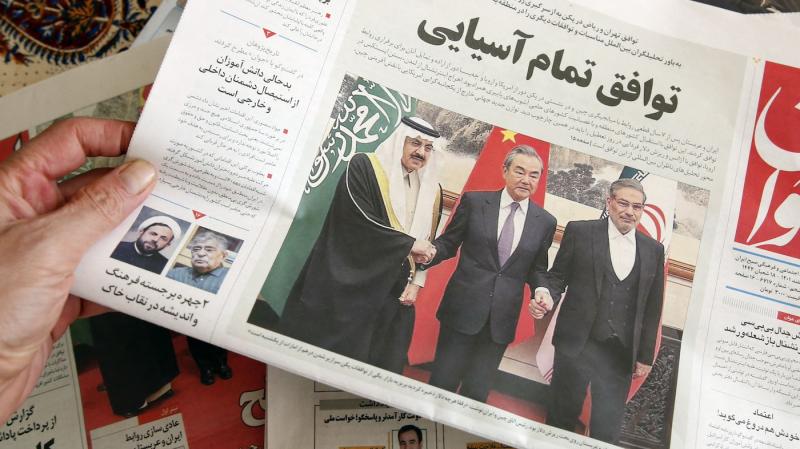As American global hegemony ends, multi-alignment rises
By: Andrew Latham (The Hill)


Ronald Reagan and Bill Clinton cannot hold the center any longer. The world is turning away from American neoliberalism. Those rust belt profits are not going to pay unwanted dividends. But, hey, greed is good and the rich got theirs. Just look at all the U-Hauls lined up to pass through the pearly gates.
The seeded article pays a lot of attention to the Middle East. That's understandable because neoliberals used oil (and petrodollar) to build empires and bully the world. But even Saudi Arabia sees the writing on the walls so are drifting toward the east. The overlooked elephant in the room is India. India is interesting because it is a technically advanced, nuclear armed, third world country. Neoliberal geopolitics have failed in India. Chinese belt and road beneficence has failed in India. India is slowly becoming a superpower the old-fashioned way, through transactional diplomacy and domestic competition against the neoliberal world markets.

Forget the "Pax Americana." The unipolar moment, that brief interlude where the United States reigned supreme, is over. China's rise, coupled with a growing discontent with the American-led rules-based international order, has ushered in a new era: a multipolar world with multiple power centers jostling for influence.
This dynamic shift demands a new foreign policy strategy on the part of all states. Enter multi-alignment, a strategic response to this new multipolar reality that involves countries forging partnerships across ideological and geopolitical divides to advance their national interests.
Unlike the rigid alliances of the Cold War, multi-alignment involves a strategic flexibility that empowers nations to navigate the complexities of a multipolar world. These partnerships are often issue-specific and impermanent, allowing countries to cooperate with different great powers depending on the context.
For instance, a nation might partner with the U.S. on matters of regional security while forging economic ties with China. This adaptability ensures that a country's national interests are prioritized — if cooperation with a particular power becomes detrimental, they can shift their focus and seek partnerships elsewhere.
This approach is particularly attractive for middle powers. These countries, with growing influence but not the global reach of superpowers, can leverage their strategic weight to extract benefits from various partners within the multipolar system; they can secure vital resources, expand their economic opportunities and exert greater influence on the international stage. In essence, multi-alignment allows middle powers to play multiple sides, maximizing their strategic gains within a multipolar landscape.
The Middle East is shifting dramatically under the influence of multi-alignment. Once a region defined by a rigid U.S.-led alliance system, the rise of China is rewriting the script. A powerful illustration of this transformation is China's recent success in brokering a thaw between regional rivals Iran and Saudi Arabia. This unprecedented diplomatic feat underscores the transformative power of multi-alignment, as traditional allies are no longer bound by rigid geopolitical ties or past membership in a bloc, but are free to pursue partnerships based on specific interests.
The implications for the Middle East are profound, potentially paving the way for a more stable regional order. We see this with how Saudi Arabia, a long-standing American ally, is deepening economic ties with China for investment and diversification away from oil dependence, while still maintaining its security relationship with the U.S. Similarly, Gulf states like the United Arab Emirates have fostered partnerships with both China and Russia, seeking economic opportunities and diplomatic support on regional issues. This multi-alignment allows these states to navigate the complexities of a multipolar world and secure their interests within the new power dynamic.
In Southeast Asia, countries like Vietnam and Indonesia have long balanced relations between the U.S. and China, but China's growing assertiveness in the South China Sea has spurred a reevaluation. Vietnam, despite its communist ideology, has strengthened its defense ties with the U.S. while maintaining economic relations with China. Indonesia, meanwhile, seeks to maintain its neutrality but has also engaged in joint military exercises with both the U.S. and China. This multi-alignment strategy allows these countries to hedge against Chinese dominance while ensuring access to vital markets in a multipolar economic landscape.
The rise of multi-alignment within a multipolar world presents both opportunities and challenges for international peace and security. On the one hand, it offers a more nuanced approach to global challenges. With power diffused across multiple actors, decisionmaking becomes less centralized and more responsive to specific regional contexts. This allows for solutions tailored to the unique needs of each situation, rather than a one-size-fits-all approach. Multi-alignment can also incentivize cooperation between former rivals on shared threats like climate change or pandemics, encouraging countries to collaborate on solutions despite past geopolitical differences.
On the other hand, the erosion of clear-cut geopolitical blocs presents potential risks. The international landscape can become more fluid and unpredictable, making it difficult to anticipate the actions of states no longer bound by rigid alliances. This fluidity can intensify competition for influence between major powers, potentially leading to proxy conflicts and heightened regional tensions. The lack of strong alliances can make it more challenging to coordinate responses to global crises; forging consensus to address a major crisis could become a more cumbersome process.
The rise of multi-alignment necessitates a fundamental shift in how international relations are conducted. Major powers must transition from a zero-sum competition mindset to one that fosters more agile frameworks that address the concerns of a wider range of actors, not just traditional allies, to ensure stability and navigate the complexities of multipolarity.
International institutions also require adaptation. Strengthening regional organizations can provide crucial platforms for dialogue and cooperation on issues of shared concern. Fostering dialogue across geopolitical divides, even between former rivals, becomes essential.
The success of multi-alignment in fostering peace and security hinges on a delicate balancing act. While fostering cooperation across geopolitical divides is crucial, it's equally important for regional and global great powers to establish and maintain a stable balance of power, as unchecked dominance by any single power — or even the pursuit of regional or global dominance — can breed instability.
The key lies in maintaining equilibrium. Major powers can contribute by engaging in strategic dialogues, promoting regional security initiatives and avoiding actions that tilt the balance towards unilateral advantage. This doesn't preclude competition, but simply ensures it occurs within a framework that prioritizes peaceful coexistence.
The success of multi-alignment hinges on a commitment to strategic agility and a nuanced understanding of national interests. Major powers must prioritize actions that promote a stable balance, avoiding unilateral maneuvers that could trigger regional tensions or ignite proxy conflicts. By embracing this new dynamic and working collaboratively within a framework of mutual respect, the international community can leverage the multipolar shift to create a more peaceful and prosperous world order.
The time for dominance is over; the time for a strategic balancing act has begun.
Andrew Latham is a professor of international relations at Macalester College in Saint Paul, Minn., a senior fellow at the Institute for Peace and Diplomacy and a non-resident fellow at Defense Priorities in Washington, D.C. Follow him @aalatham.






Focusing attention on Cold War adversaries and Middle Eastern energy resources is a dreadful mistake with dire consequences. Trying to revive that past will make the United States less relevant in world affairs than the United Kingdom; the kooky uncle of geopolitics. Attempting to continue the neoliberal status quo can only result in more geopolitical conflicts that the United States cannot win; bleeding the country dry to achieve nothing of import.
If the United States wants to maintain its dominance around the world then neoliberals cannot continue to wield autocratic power over the United States. Reagan is finally dead and Clinton is irrelevant.
So, who or what is more relevant today?
Biden, and the progressive ideology of one-party authoritarianism; or Trump's brand of populism?
IMO that is the wrong question. Biden and Trump present a contrast in unavoidable consequences.
Biden's authoritarian governing style is actually a continuation of the neoliberal status quo established by Reagan and Clinton. That neoliberal status quo has become so highly visible because Republicans have, to a large extent, abandoned the political playbook of the last fifty years. That's one reason Biden's approval is in the toilet; the political landscape has changed. Reagan and Clinton cannot hold the center any longer. The US (and the world) are closing the chapter on the 'rule based world order' crap that gave us coalitions of the willing.
Trump's populism only fills a vacuum. Trump doesn't have the Moxy (or vision) to be a transformative politician. Trump can loosely be described as an anti-neoliberal politician but Trump doesn't have what it takes to be a post-neoliberal politician.
The consequences of Biden will be lack of preparation for the next phase in geopolitics. Attempting to maintain the neoliberal status quo will require the US to become involved in more regional conflicts that will require a lot of arm twisting and bribery to built a coalition. Going down Biden's path will bankrupt the US before the century is out.
The consequences of Trump is the increased risk of missed opportunities. Trump's focus on Europe will prove to be a distraction that may allow adversaries/competitors to establish geopolitical blocs that can isolate and contain the US. The United States will have little choice to again become competitive in the global markets. Realistically US competitiveness will require a serious adjustment in the economy and it's quite likely that Trump would do the absolute worst things at the absolute worst time. Trump knows how to exploit conditions but cuts and runs after he gets what he wants.
From my point of view, I consider that article to be a brilliant and superrealistic analysis.
It is about time that those who speak "competition" but really mean (and in fact practise) "confrontation" were to realize that "cooperation" to the extent of "partnership" is the best direction to benefit all of humanity.
The quote you selected is all about reviving the neoliberal world order. China would certainly want to do that because China has learned how to play that geopolitical game. But that's why the neoliberal world order is going to fade.
IMO what's coming will be an inverted imperialist world order. The geopolitics have already shifted toward the world exploiting the major powers instead of major powers exploiting the world. The world order, as we have lived it, is beginning to fade into obscurity. Attempting to artificially maintain the neoliberal world order won't lead us toward peaceful coexistence; we'll become embroiled in so many regional brush wars that the stability of government will be threatened.